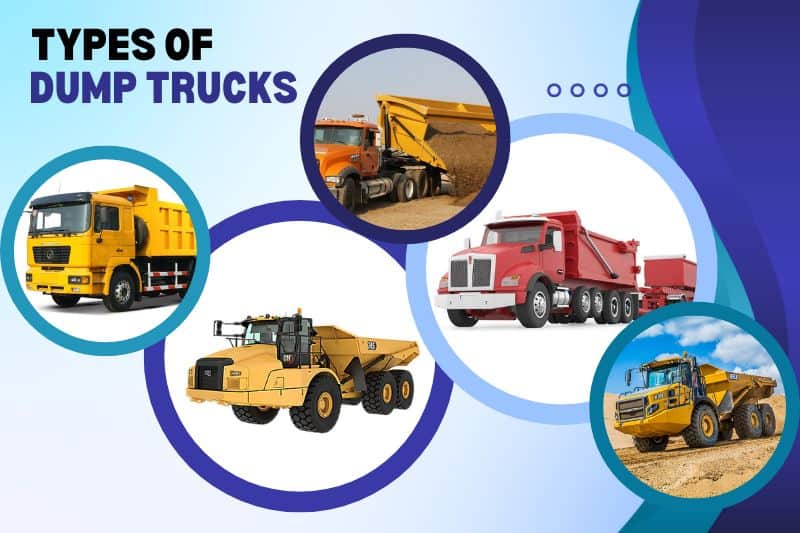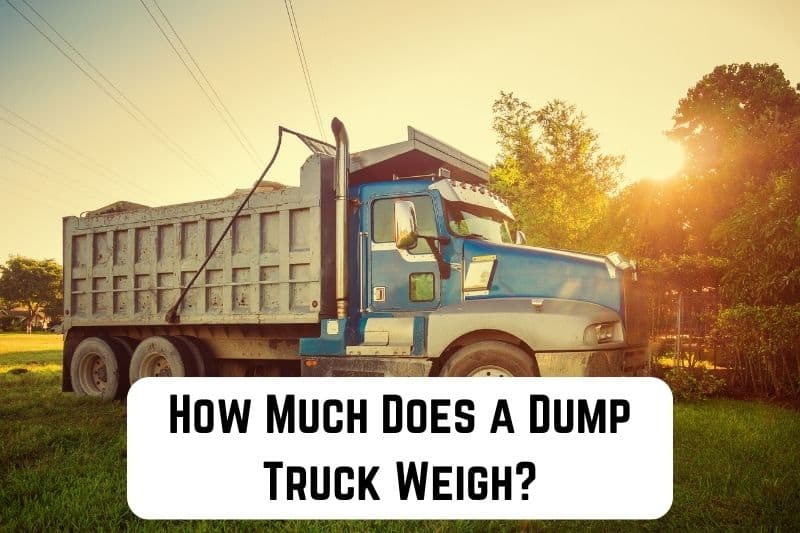Have you ever wondered how much a dump truck weighs? Driving down the highway, you’ve likely encountered these massive machines, often carrying heavy loads such as gravel or construction debris. Understanding the weight of these vehicles can help give you a better sense of their capabilities and role in various industries.
The weight of a dump truck depends primarily on its size and the materials it’s carrying. A standard dump truck, for example, weighs around 25,000 to 35,000 pounds when empty. However, it can weigh as much as 70,000 pounds or more when fully loaded with materials.
Read: How Much Does Football Weigh? (Complete Guide)
A standard dump truck can generally weigh 20,000 to 35,000 pounds (10 to 17.5 tons) when empty. Single-axle dump trucks have a gross vehicle weight (GVW) of around 26,000 pounds. Tandem axle dump trucks have a GVW of around 52,000 pounds. Tri-Axle dump trucks have a GVW of approximately 80,000 pounds.
Types of Dump Trucks

Knowing the different types available is essential when you’re in the market for a dump truck. In this section, you’ll get familiar with various kinds of dump trucks used in multiple industries.
Standard Dump Trucks are the most common type on construction sites. They have a standard truck chassis with a hydraulic lift mounted at the rear to lift the hinged bed. This enables the cargo to be dumped off swiftly. They are versatile and come in different sizes to accommodate your project requirements.
Articulated Dump Trucks (or ADTs) have two separate pieces connected at a pivot point. These trucks are designed to handle rough terrain and uneven surfaces, as you would find in construction or mining sites. The articulation system improves maneuverability, while the all-wheel-drive system enhances traction in challenging conditions.
Transfer Dump Trucks are equipped with a separate trailer called a “transfer” that carries the material to be dumped. These trucks are used when transporting a large volume of materials.
The primary advantage of transfer dump trucks is that they can handle more weight, reducing the number of trips you’ll make to and from the job site.
Side Dump Trucks have a unique dump body that can tilt to the side instead of the rear. This allows for quick and efficient dumping of materials along a linear stretch, such as road construction projects or large excavation sites. Their design gives them a lower risk of tipping over and excellent stability compared to other types.
Off-Road Dump Trucks are designed to tackle rough terrain and challenging off-road conditions. They have reinforced frames, a powerful engine, and oversized tires to help navigate different environments.
These dump trucks are ideal for mining operations, quarries, or large-scale earthmoving projects where roads may be inaccessible or nonexistent.
Average Weight of a Standard Dump Truck
When considering how much a dump truck weighs, it’s essential to recognize that there are various types and sizes of dump trucks. A standard dump truck can generally weigh 20,000 to 30,000 pounds (10 to 15 tons) when empty.
Now, you might be wondering about the weight of a loaded dump truck. In this case, it largely depends on the type of material being hauled and the truck’s capacity.
For instance, if a standard dump truck is carrying sand, the weight of the sand may be around 3,200 pounds per cubic yard. So, if the truck has a capacity of 10 cubic yards, the total weight of the sand it can haul would be approximately 32,000 pounds.
To give you a better idea of the capacities and weights of different dump trucks, here’s a brief list:
- Single Axle Dump Trucks: These trucks can haul roughly 5 to 6 cubic yards loads and have a gross vehicle weight (GVW) of around 26,000 pounds.
- Tandem Axle Dump Trucks: A bit larger than single axle trucks, these can carry loads of about 14 to 15 cubic yards, with a GVW of around 52,000 pounds.
- Tri-Axle Dump Trucks: These trucks have a higher capacity, transporting around 18 to 20 cubic yards with a GVW of approximately 80,000 pounds.
Remember, your local regulations and restrictions may also dictate weight limits, so it’s crucial to be aware of the specific rules in your area.
Overloading a dump truck can also be dangerous and may result in fines or other penalties. Always exercise caution and adhere to safety guidelines when operating a dump truck, regardless of size or weight.
Differences in Weight by Dump Truck Model
When figuring out how much a dump truck weighs, it’s essential to consider the many different models on the market. Depending on the size and design, some models will be considerably heavier than others.
One popular model you might come across is the Caterpillar 797F. This massive haul truck can weigh around 687.5 tons when fully loaded, while its empty weight is about 264 tons. Make sure to keep this in mind if you ever have a chance to operate one of these giants.
Read: How Much Does a Fire Truck Weigh?

On the other hand, you’ll find smaller dump trucks like the Ford F-450, which weigh around 4.5 tons. These trucks are perfect for shorter trips and smaller loads. They are much easier to operate and less imposing on the road.

Medium-sized dump trucks, such as the Kenworth T880 or the Peterbilt 567, will also vary in weight. Depending on their purpose and configuration, these could weigh 15 to 30 tons. Here’s a quick breakdown of typical weights for these types of trucks:
- Kenworth T880: 15-30 tons
- Peterbilt 567: 20-27 tons

In general, you can expect the following weight ranges based on the dump truck classification:
- Light-duty dump trucks: 4-10 tons
- Medium-duty dump trucks: 11-30 tons
- Heavy-duty dump trucks: 31-60 tons
Factors Influencing Dump Truck Weight
When considering dump truck weight, it’s important to remember that several factors can influence it. By understanding these factors, you can better estimate the weight of a dump truck and make informed decisions when utilizing them.
Manufacturing Material: The material used to construct the dump truck significantly affects its weight. Dump trucks are primarily made of steel, aluminum, or both. Steel is durable and heavy, while aluminum is lighter but less sturdy.
Size and Type of the Truck: Dump trucks come in various sizes and types, such as standard, articulated, and off-highway trucks. A standard dump truck commonly weighs between 20,000 and 30,000 pounds, while an articulated or off-highway truck weighs 30,000 to 100,000 pounds or more.
Payload: The weight of the material being transported greatly influences the overall weight of a dump truck. The carrying capacity of a dump truck, known as its payload, varies depending on the size and type of the truck. A standard dump truck can carry around 13 tons, whereas articulated and off-highway trucks transport up to 55 tons.
Attachments and Accessories: Additional equipment and components fitted to the dump truck, such as tarp systems, liners, and sideboards, contribute to the overall weight. Accessories like toolboxes, chains, and hydraulic systems add extra pounds to the dump truck.
Read: How Much Does an Appendix Weigh? (Detailed Guide)
Importance of Knowing Dump Truck Weight
- Ensures Safety: Understanding your dump truck’s weight promotes safer roads and responsible driving, reducing the risk of accidents.
- Legal Compliance: Knowing your vehicle’s weight helps you adhere to legal weight limits set by authorities, avoiding fines and penalties.
- Preserve Infrastructure: Many regions have weight restrictions to protect roads and infrastructure. Being aware of your truck’s weight helps prevent damage to public roads.
- Optimizes Efficiency: By avoiding overloading, you maintain your truck’s efficiency, ensuring it operates at its best and saving on fuel costs.
- Prolong Lifespan: Prevents unnecessary wear and tear on vital components such as suspension and brakes, leading to fewer repairs and longer vehicle lifespan.
- Enhances Control: Properly loaded trucks are more accessible to control, reducing the risk of accidents and promoting overall road safety.
Understanding your dump truck’s weight is not just about numbers; it’s about ensuring safety, compliance, efficiency, and cost-effectiveness.
How to Measure Dump Truck Weight?
To measure your dump truck’s weight, take it to a certified truck scale. These scales can be found at truck stops, waste management facilities, and specific construction sites. Here’s a step-by-step guide to help you through the process:
- Locate a Certified Scale: Search online for nearby certified truck scales. Ensure the scale is calibrated regularly to provide accurate weight readings.
- Empty Your Dump Truck: Before weighing your truck, empty its contents. An accurate weight measurement ensures compliance with local regulations and prevents fines.
- Drive Onto the Scale: Carefully position your dump truck on the scale, ensuring all tires are within the weighbridge’s boundaries. Follow the operator’s instructions in aligning your vehicle correctly.
- Record Your Truck’s Weight: The scale operator will provide a weight ticket showing your truck’s gross vehicle weight (GVW). Keep this ticket for your reference to ensure you comply with weight regulations.
When measuring your dump truck’s weight, consider factors that can affect its overall weight, such as added accessories, variations in body styles, and chassis inconsistencies.







